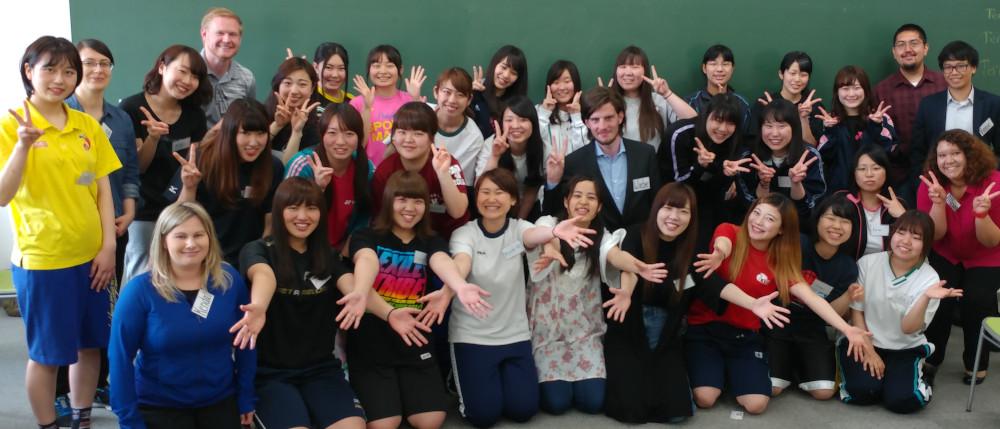We offer a world-renowned TEFL / TESOL certification course in Tokyo, Japan, that prepares you for teaching English overseas, or in your home country. Our TEFL certification courses last for four weeks and have a very practical emphasis. There is no need to speak any language other than English, as our courses concentrate on training you to teach English with the international standard communicative approach – where English is the only language used in the classroom.
This is the most practical and fundamental area of any TEFL training course. During the teaching practice sessions, trainees have the opportunity to teach real students of English and put into practice the skills learnt during the theoretical parts of the course.
2) Foreign Language Experience
During the course, trainees receive instruction in an unknown foreign language to help them reflect on the experience of being a learner. This session is extremely useful in creating empathy between the teacher and student and should help trainees to direct their own teaching.
3) Language Awareness
a) This area focuses on grammar and covers subjects such as parts of speech, the structure of tenses, conditionals and modals and other common grammar points. During these sessions trainees learn about these subjects as well as ways to teach them to their future students in the classroom.
b) This area also looks at the subject of phonology and covers phonemics, word and sentence stress, intonation and connected speech.
4) Student Profile
For this part of the course, each trainee is required to work with an individual student in order to work on things such as rapport building, error analysis, correction techniques and addressing individual student needs. Three meetings with the student are required to complete the profile, after which the trainee completes a one-to-one lesson with their student. The final stage is the completion of a written report regarding the lesson.
5) Teaching Techniques
This component of the course covers areas such as:
- Lesson planning
- Classroom management
- Establishing rapport
- Discipline in the classroom
- Managing equipment and teaching aids
- Creating materials
- Correction techniques
- Evaluation and testing
- Teaching vocabulary
- Teaching grammar
- Teaching receptive skills (reading and listening)
- Teaching productive skills (speaking and writing)
- Games in the classroom
- Songs in the classroom
- Teaching beginner students
- Teaching individual students
6) Materials Project
All trainees are required to create their own set of materials to be used during the teaching practice. These materials will be useful in future teaching environments and will help to instill the benefits of creativity and resourcefulness in relation to your lesson planning. The materials should be easily portable, durable and adaptable for different lesson points.
Once you have created your materials project you will present it to a course trainer and demonstrate how it will be used in the classroom. Your trainer will then provide advice and suggestions on how they can be improved and how they could be used in another context.
Apply Today
All applications from candidates aged 18 (younger ages may be considered in exceptional circumstances) and above will be considered for our English teaching courses. Our in-class TEFL courses are intensive, four-week programs; however, all trainees should still have sufficient time to explore the local area, experience the culture and to meet new people. Also, individual course organizers will often arrange leisure activities for our trainees so they can socialize in their spare time and make the most of their experience.
Getting Started
The first step in enrolling on our TEFL course in Tokyo is to complete a free application. If you are at least 18 years of age and speak English fluently, you are eligible to apply for the course. The application is brief and we will send you a prompt reply. Once approved, you will receive additional information about the course content and schedule, your accommodation options, travel arrangements, as well as payment options and more.
If you do choose to take your TEFL course in Japan, it doesn’t mean you have to stay there and teach. If you would like to move on after the course we can help you find a job nearly anywhere in the world. Apply today and you will be on your way to starting a TEFL course in the Far East.
Course fees
The total price is divided into: deposit and balance.
The deposit may be paid via a) credit card b) PayPal c) wire transfer d) Western Union.
The balance of the course fee must be paid by cash, PayPal or bank transfer directly to the training center on the first day of the course.
Reviews
TEFL Tokyo | TEFL Japan
Tokyo is a truly wonderful city in which to complete your TEFL training. This endlessly exciting city has welcoming and friendly people, world class bars and restaurants, a vibrant and varied nightlife and streets that constantly bustle with energy. You will also find the city has very little crime, a variety of public transport options that run like clockwork, convenience stores in the form of 24-hour shops and vending machines that cater to every imaginable need, as well as numerous cultural attractions such as museums, theatres and art galleries.
On top of these attractions, you will also find plenty of post-TEFL course opportunities for teaching English right across Japan as the job market is very healthy year round. A wide variety of employers all seek the services of a qualified EFL teacher and with the help of our lifetime job support services, your chances of finding employment in Tokyo, elsewhere in Japan or anywhere else in the world are very high.
TEFL Course in Tokyo
Our TEFL training centre in Tokyo is conveniently located only a 15-minute walk from JR Kanamachi and Keisei Kanamachi train stations. Our facilities are modern, comfortable and well equipped with all the materials and resources you will need to successfully complete the course.
Our course trainers are dedicated to providing you with personalised attention during your studies, as well as during your lesson planning and observed teaching practice. We only use local Japanese students who are keen and enthusiastic so classes are always a positive experience and provide you with valuable practice in the classroom. Accommodation prices in Tokyo do vary considerably so once you have reserved your seat on the course, we will be happy to help you select and book the accommodation option that best suits your budget and personal preference.
The course fees listed on our website are inclusive of course-related lessons, materials, teaching practice, assessments, certificates, references, lifetime job assistance and more. We have no hidden costs or extra charges so the prices you see on the site are the prices you will pay.
ITTT, Tokyo!
Accommodation
There are a number of accommodation options available to you during your TEFL course in Tokyo. Once you have confirmed your place on the course, our staff at the Tokyo TEFL training centre will be happy to help you arrange the most suitable accommodation for your stay with us. Alternatively, you are free to make your own arrangements if you would prefer.
Our recommended options are as follows:
- Guest House: A single room in a local guest house from around US$ 500 to US$ 1500 per month.
- Guest House: A shared Room in a local guest house from around US$ 500 per month, based on two or three trainees sharing a guest house room. Male and female guests are placed in separate rooms.
- Dormitory: From around US$ 450 per month, based on four or more people sharing a large room. Once again, male and female rooms are divided.
Accommodation Fees
The accommodation fees are not part of the course price and you are free to choose whichever accommodation option you prefer.
You are not obliged to use the accommodation provided by the school and you are welcome to make your own accommodation arrangements. If you choose to use our accommodation, it should be paid for either by cash, PayPal or bank transfer directly to the school at the start of the course.
Reviews
FAQs
What are my payment options?
Course deposits must be paid to our administrative center. Credit/debit card payments are the fastest and cheapest way to pay, but we also accept payments via Western Union, Pay Pal and bank transfer. While there are no deadlines for a deposit, courses can fill up quickly and your seat will only be reserved after the deposit has been paid.
Once you make your deposit, you will receive an email with an informational packet that provides detailed information about the course and Tokyo itself.
The balance of course fees is payable on the first day via credit card, or two weeks in advance via bank transfer. Please note that cash payments are not accepted.
Course fees are all-inclusive so you won’t be asked to pay additional costs for course related materials or services. This also includes course moderation, accreditation fees and lifetime job assistance.
What are my accommodation options?
Course Residence (¥ 60,000): Private rooms are available in the training center residence located just minutes from the school. Additional nights can be added at the rate of ¥ 3,000 per night.
A variety of hostels and hotels are also available, although prices for these options do vary considerably.
What travel documents will I need for Japan?
All visitors to Japan are required to carry a passport valid for at least six months after their arrival date.
Passport holders from the UK, the US, Canada, Ireland, Australia and New Zealand wishing to enter Japan are generally granted a ‘Landing Permission’ at any airport in Japan.
* As this information is subject to change at any time, we advise everyone to contact your local consulate for current travel regulations prior to planning your trip.
What is the course schedule?
There are input sessions every morning from 8:00 a.m. to 1:00 p.m. when trainees learn classroom management, grammar, language and culture and other practical aspects of the course. Lunch is from 1:00 p.m. to 2:00 p.m. From 2:00 p.m. to 3:30 p.m. trainees prepare their lessons and then teach them to Japanese students. These lessons are followed by immediate feedback from the instructors. You will not be teaching every afternoon, we aim to provide six to eight hours of observed teaching practice over the four-week course. In addition to these hours, there is also time that must be spent preparing materials and completing various assignments.
During the course, you will have the experience of being a learner of an unknown language using the same techniques as you will use to teach English. This is so trainees get to experience the problems that students will face from their perspective. We advise against taking any additional language classes during the course as the program is very intensive and you simply won't have the time!
What can I expect during teaching practice?
We use local Japanese students for the trainees’ teaching practice. Japanese students are very keen and enthusiastic and classes are a very positive experience. You will receive the aid of your course trainer throughout lesson planning and receive immediate feedback on your lesson after it’s been delivered. Practicum is assessed and a satisfactory assessment is required to earn your TEFL/TESOL certificate.
Who usually attends the course?
On average we have around five to twelve trainees enrolled on each course, although this number does vary throughout the year. Most of the participants are American, British, Canadian or Australian, although we do accept non-native speakers of English who have a high proficiency in the language.
Is there a dress code?
For all input and tutorial sessions at the training location, there are no specific dress requirements. We simply ask that you are mindful of your peers and respectful of the fact that you are a visitor in another country.
What should I bring for course studies?
Please be sure to arrive on the first day of the course with a notebook and a pen. We also encourage you to bring a laptop as we have Wi-Fi at the training center. We will provide all course materials for you so there is no need to bring anything else for the course itself.







